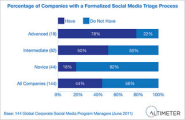-
About
- About Listly
- Community & Support
- Howto
- Chrome Extension
- Bookmarklet
- WordPress Plugin
- Listly Premium
- Privacy
- Terms
- DMCA Copyright
- © 2010-2025 Boomy Labs

 jillian ney
jillian ney
Listly by jillian ney
A list of some of the social media news items I've been reading and want to store for future reference

The use of Facebook has increased rapidly. We are dealing with a subdivision of Internet addiction connected to social media, Doctor of Psychology Cecilie Schou Andreassensays about the study, which is the first of its kind worldwide.

Has social media changed how we complain, and is this approach taking over from lodging grievances with call centres?

There’s more to social than just data. Social involves a mindset that prizes openness and collaboration and a method that stresses agility, capabilities that allow individuals to work quickly, on the go, on the cloud. These aspects of social are transforming market research.

But start-ups are warned not to abandon traditional methods of communication

Over the past three years the Young Foundation has been working with several communities to test how social media can empower local people.

Global demographics and technology have drastically changed architecture and design over the last 10 years. According to Cheryl Durst, executive vice-president and CEO of the International Interior Design Association , a younger world and social media are transforming how people think about their relationships to work and the office environment must respond accordingly.

The Atavist, which helps produce multimedia storytelling for digital devices, has a content management system that has turned into a business opportunity.

When Mark Zuckerberg and his buddies first posted their ‘Facemash’ social media programme on Harvard University’s computer system almost nine years ago, they could never have imagined the extent of its future success. The hackers unleashed a new

Study how your brand can continuously optimize content and social media participation to attract, engage, and inspire your customers.

It's not enough to have a website, mailing list, Facebook page, or even a mobile application, says Huge CEO Aaron Shapiro. Businesses need to create digital assets that are core to how they operate and provide real value to users. Here's where to focus resources and energy.

Social media has dangers for the young professional. Savvy young professionals know there are social media guidelines that must be followed.

Social networking sites such as Facebook and Twitter feed anxiety and make people feel inadequate, a study has found.

Last month’s post – “Insights vs. Metrics: Finding Meaning in Online Qualitative Research” – talked about “social media metric mania” and the value of off- and online qualitative research tools “th...

Tools and tips to bridge and enhance online/offline live events This post by Lisa Harris, Nicole Beale and Graeme Earl reports on the findings of our Soc. Marketing topic(s):Social media strategy. Advice by Guest Expert.

There are time-tested and proven market research tactics companies can leverage for new product development, from surveys and focus groups to SWOT analyses and competitive research, but there’s a nagging problem: It’s extremely time consuming and ridiculously expensive. What companies don’t realize (often enough) is that bringing social media into the game plan can shave months and significant expense off the product innovation process.
To be fair, we have seen some companies invest in social media community building, using tools from companies such as Communispace, as a means to use social for new product development (e.g., Lego’s online community, Mindstorm, invites customers into the new product development process early on; Lego sets created with Mindstorm input often become best sellers). While this approach can work, there are actually much easier and less labor intensive ways to leverage social for new product development.
Let me share an example. We recently performed a new product development analysis for a Fortune 100 CPG client that wanted to explore an alternate means for product and concept generation. After performing a detailed profit pool analysis, this client selected a few categories that would likely drive the most revenue and profit with new innovation (following R&D investment). After identifying, they turned to social media research. In a matter of weeks, this global CPG company was able to access, analyze and confidently pinpoint the category and the underserved consumer groups they could target, and ultimately developed new product concepts to prototype (sample results from CPG client illustrated in Figure below).
There are three key steps brands can implement to use social to drive product development quickly and with significantly reduced costs:
Determine category of focus– perform research on each of your potential categories to get a broad understanding of what consumers are talking about. This will provide a lens into popular topics around certain products, emerging niche areas and underserved market needs – which will lead you to discover where new product development efforts should be focused. Our client decided to focus on vitamins and supplements
Identify ‘organic segments’ – people naturally align themselves into specific groups online, gravitating to communities and topics that interest them. How individuals group themselves may or may not mirror pre-defined demographics or psychographic groupings. Using social media analysis you can discover these new users and use cases, all of which will inform new product concepts for your category.
Discover key pain points and passions – identify product desires and concerns for each segment and sub segment to understand the specific problems or needs your customer groups want addressed. This will inform features, benefits and functionality for the new product concept, allowing you to align what may exist now with what you need to plan for; in other words, fill in the gaps.
Vitamin conversation yields four audience groups with various needs, desires, and concerns
*Summary of findings for CPG Fortune 100 client. Information has been blinded to protect findings.
How can this approach help your company make their product development and innovation processes more efficient and cost effective? We’d love to hear what you think.

Last week the BBC’s Rory Cellan-Jones reported on a ‘virtual bagel’ experiment he conducted with Facebook. The research was simple, set up a ‘virtual bagel’ company page and drive Facebook Likes with paid advertising on the network. A novelty idea with the ‘virtual bagel’, the question is who would ‘like’ such a company? Cellan-Jones was definitely testing the value of ‘paid’ advertising on Facebook and to a lesser extent the value of a Facebook ‘Like’.

Advertising and media are converging. The results will disrupt how companies must deploy their marketing efforts. Marketers, and their agency partners must converge their media efforts by combining social, corporate content, and advertising reach –or risk connecting with the fleeting customer.

I am collaborating with Robert Scoble on a new book, The Age of Context. It is about the next phase of technology's relentless advance. We are talking about an era where our relationships with our technology becomes far closer because the technology understands who we are, where we are and [...]

Left: Altimeter Research found that most companies lack a formalized process –and even out of the advanced, only 76% had a process in place, read the full report on Social Readiness.
![Why Facebook just doesn't cut it [infographic] | Econsultancy](http://cdn.econsultancy.com/assets/logo-solid-9dd7d47c8d07f419bb7d7fb2f964ace2.png)
This infographic, from Get Satisfaction, argues that there is a gap between how customers want to engage with brands on social media, and how companies are actually using Facebook.

Social media sites like Facebook, Instagram, and Pinterest have ushered in visual marketing as the breakout trend for 2012. When it comes to their products, businesses are learning to show, not tell, and visual content sites are fueling our desire for beautiful photography and sensational design. Two years ago, marketers were spreading the maxim that "content is king," but now, it seems, "a picture really is worth a thousand words." "Blogs were one of the earliest forms of social networking where people were writing 1,000 words," says Dr. William J.

Hype continues to surround Big Data analytics. But hype or not, data-driven decision-making is becoming central to management decisions at most enterprises. They are taking inspiration from Billy Beane, the general manager of the Oakland Athletics baseball team that turned to data analytics (known as Sabermetrics in baseball and made popular in the movie, "Moneyball") to assemble a competitive baseball team despite the organization's limited financial resources.
